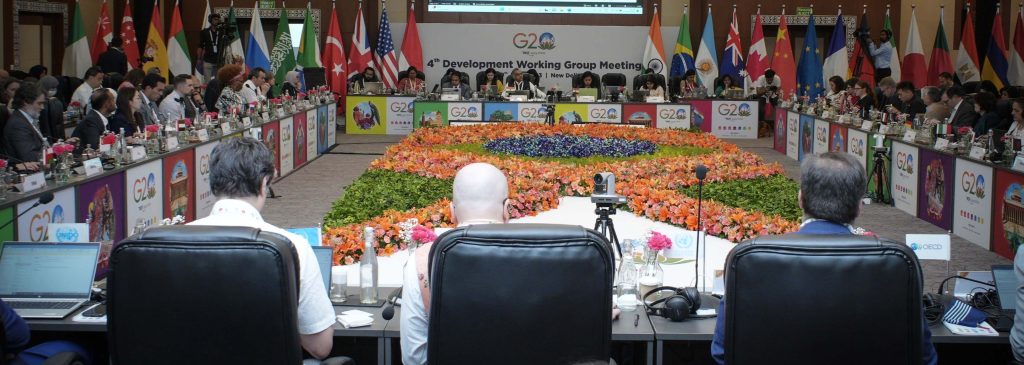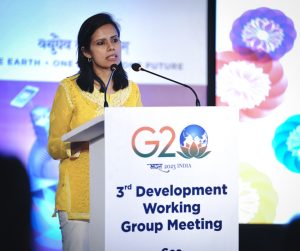By Eenam Gambhir
The year 2023 is crucial as it marks the midpoint of the 2030 Agenda for Sustainable Development, which is the only roadmap for collective actions to achieve the social, economic and environmental dimensions of sustainable development. However, multiple crises have derailed progress towards achieving the Sustainable Development Goals (SDGs) and have underscored the persistent vulnerabilities and imbalances faced by developing countries.
The countries of the Global South were severely impacted by the disruptions caused by the COVID-19 pandemic, which were further exacerbated by the food, fuel and fertiliser crises. According to UN estimates, developing countries require at least $4.3 trillion per year to reach their SDG goals. The Sustainable Development Goals Report 2023 by the United Nations highlights that only about 12% of the SDG targets are on track, and 30% have either shown no progress or have regressed below the 2015 baseline.
At the same time, extreme weather events are becoming increasingly common, glaciers are shrinking and the intensity of biodiversity loss is rising. Between 2015 and 2020, the world lost approximately 10 million hectares of forests per year. Today, more than two-thirds of the world’s ocean ecosystems are damaged, degraded, or modified. UNFCCC’s recent analysis of climate financing needs indicates that developing countries require at least $6 trillion by 2030 to meet less than half of their existing Nationally Determined Contributions. With the world already at 1.1°C of warming, without extraordinary action, the 1.5°C temperature increase is likely to be surpassed in the coming decades, possibly by the middle of this century. The recent crises have exposed the shortcomings of international institutions, which have been unable to deliver for those who need them the most.
Shaping Global Agenda

In this backdrop, India assumed its G20 Presidency, along with the responsibility of shaping the global agenda. India engaged extensively with multiple stakeholders at all levels throughout the G20 process. In January 2023, over 125 countries were consulted during the first-ever ‘Voice of Global South’ Summit, aimed at addressing the specific concerns and challenges of the Global South within India’s G20 priorities.
The theme of the Indian Presidency, “One Earth, One Family, One Future,” was chosen by Prime Minister Narendra Modi as a vision for a world where no one is truly left behind. India’s G20 Presidency introduced priorities with a particular focus on developing countries. These priorities included accelerating progress towards the SDGs, facilitating inclusive and resilient growth, promoting green development and lifestyles for sustainable development, reforming multilateral institutions for the 21st century, advancing gender equality and women’s empowerment, and promoting technological transformation and increased access to digital public infrastructure.
Global Growth
The presidency collaborated with all G20 partners to find pragmatic solutions to the multidimensional crises and championed ambitious, concrete and collective G20 actions to create opportunities for all while addressing structural vulnerabilities and imbalances, particularly those faced by developing countries.
One of the notable achievements of the presidency has been redirecting the G20’s focus to its original mandate of fostering global growth and development, shifting the discussions away from East-West divides and North-South tensions. Today, developing countries face increasing resource and capacity constraints in fulfilling the aspirations of their people due to shrinking fiscal and policy space needed to simultaneously meet development, environmental and climate goals. Implementing the 2030 Agenda in the next seven years is indeed possible, but the transformational transitions required are on a scale and timeframe faster than ever before in our history. Achieving the SDGs can only happen through unprecedented global cooperation and the promotion of bold collective actions that align with changing realities.
In his address to the G20 development ministers, Prime Minister Modi urged them to collectively assume responsibility to prevent any further setbacks to the SDGs. Recognising that developing countries are crucial stakeholders in implementing the 2030 Agenda and achieving its SDGs, the G20, under the Indian Presidency, unanimously adopted the ambitious multi-year ‘G20 Action Plan to Accelerate Progress on the SDGs’ on June 12, 2023, during the Development Ministerial in Varanasi. This plan represents a coordinated, integrated and inclusive roadmap for G20 actions, taking into account the specific needs of countries, especially those in the Global South.
Through this action plan, India has addressed one of the key requests that emerged from the Voice of Global South Summit: progress toward a world where developing countries can access the support they need, including adequate and affordable finance, capacity building, and technology transfer to implement the 2030 Agenda. The action plan not only strengthens G20 commitments to the development agenda but also presents decisive transformative actions to create an international enabling environment and policy support system that aligns with developmental needs and priorities. Furthermore, it aims to tackle the challenges that developing countries face in accessing affordable financing and enhancing the representation of developing countries in global decision-making.
Action Plan

Under India’s leadership, G20 countries have pledged to take robust and collective actions in the following areas: digital transformation, the implementation of sustainable, inclusive, and just global transitions that leave no one behind, and sustainable development through gender equality and women’s empowerment.
The action plan recognises that digital technologies have the potential to empower people by promoting social justice. The integration of digital technologies in governance is generating extensive datasets that can advance the development agenda. The G20 has also unanimously adopted the G20 Principles on Harnessing Data for Development to bridge the digital and data divide, promote digital technologies and data usage for development, and enhance capacity building in data.
In line with India’s aspiration to minimise trade-offs between development, growth, and climate agendas, the action plan promotes the right to development by collectively facilitating climate-resilient growth pathways through an international enabling environment that is adaptive, proactive, and responsive to the needs of developing countries in the 21st century. It encourages international partnerships to strengthen institutional frameworks and enable clean, sustainable, just, affordable, and inclusive energy transitions through improved access to finance, technology, and capacity building.
Women’s empowerment and women-led development are key priorities of the Indian Presidency. Achieving holistic global development is not possible without the active participation of women. The G20 has called for a paradigm shift in the role of women, recognising them as agents of change and decision-makers in addressing global challenges effectively, decisively, and inclusively, as well as leaders in development planning and implementation.
The 2023 action plan has also garnered strong consensus on financing for the SDGs, emphasising the need to scale up adequate, accessible, affordable, and long-term financing for developing countries. This includes addressing financing bottlenecks and continuing to improve the mobilization of finance. Additionally, the call has been made for reforming the international financial architecture and evolving multilateral development banks to make them more responsive to the development needs of the Global South. Developed countries are also urged to fully fulfill their development and climate finance commitments.
New Development Model
Through the unanimous adoption of the action plan by development ministers, the G20 has sent a powerful message to the world: achieving the 2030 Agenda is not a choice but a necessity. Only through unprecedented global cooperation and solidarity can we recover sustainably from the current disruptions, reverse the setbacks in developmental progress, and get back on track to achieve the SDGs.
In light of emerging needs, lessons, and challenges, there is a compelling case for a new development model – one that accelerates decarbonisation and a just energy transition while simultaneously promoting economic growth and job creation. The Indian presidency has advanced climate action by addressing critical gaps and creating pathways for green, low-carbon economies. It envisions an ambitious Green Development Pact to be adopted by the Leaders – a blueprint of actions for the next decade that facilitates green development, driven by investments in implementing just energy transitions, Lifestyles for Sustainable Development, climate finance, and the conservation and protection of ecosystems.
Development ministers have recognised that social and economic development relies on the sustainable management of our planet’s limited natural resources. They are committed to strengthening the G20’s efforts in developing an integrated approach to achieving sustainable development in a balanced and comprehensive manner. The adoption of the G20 High-level Principles for Lifestyles for Sustainable Development was a significant milestone, strengthening the connections between development, environment, and climate goals. It builds on sustainable lifestyles and sustainable consumption and production patterns, as recognised in the 2030 Agenda, especially SDG 12, the UNFCCC, and the Paris Agreement, as well as the achievements of past G20 Presidencies.
The COVID-19 pandemic served as a stark reminder that we are interconnected, and so are our problems and their solutions. Our future depends on the prosperity of all. Implementing the development, climate, and growth agendas necessitates trust and robust accountability. The political momentum generated by the G20’s actions for sustainable development needs to be advanced in upcoming international forums. There is a need for greater ambition, stronger international policy actions, and increased financing to achieve a sustainable future. We have witnessed renewed forms of cooperation and collaboration within the G20 grouping and beyond. It is time to implement the new vision outlined by the G20 Development Ministers to achieve a sustainable, inclusive, and resilient future for all.
(Eenam Gambhir the Co-Chair of the Development Working Group of G20, Government of India. Views are personal.)
Author Profile
- India Writes Network (www.indiawrites.org) is an emerging think tank and a media-publishing company focused on international affairs & the India Story. Centre for Global India Insights is the research arm of India Writes Network. To subscribe to India and the World, write to editor@indiawrites.org. A venture of TGII Media Private Limited, a leading media, publishing and consultancy company, IWN has carved a niche for balanced and exhaustive reporting and analysis of international affairs. Eminent personalities, politicians, diplomats, authors, strategy gurus and news-makers have contributed to India Writes Network, as also “India and the World,” a magazine focused on global affairs.
Latest entries
 DiplomacyJanuary 5, 2026India walks diplomatic tightrope over US operation in Venezuela
DiplomacyJanuary 5, 2026India walks diplomatic tightrope over US operation in Venezuela India and the WorldNovember 26, 2025G20@20: Africa’s Moment – The Once and Future World Order
India and the WorldNovember 26, 2025G20@20: Africa’s Moment – The Once and Future World Order DiplomacyOctober 4, 2025UNGA Resolution 2758 Must Not Be Distorted, One-China Principle Brooks No Challenge
DiplomacyOctober 4, 2025UNGA Resolution 2758 Must Not Be Distorted, One-China Principle Brooks No Challenge India and the WorldJuly 26, 2025MPs, diplomats laud Operation Sindoor, call for national unity to combat Pakistan-sponsored terror
India and the WorldJuly 26, 2025MPs, diplomats laud Operation Sindoor, call for national unity to combat Pakistan-sponsored terror








